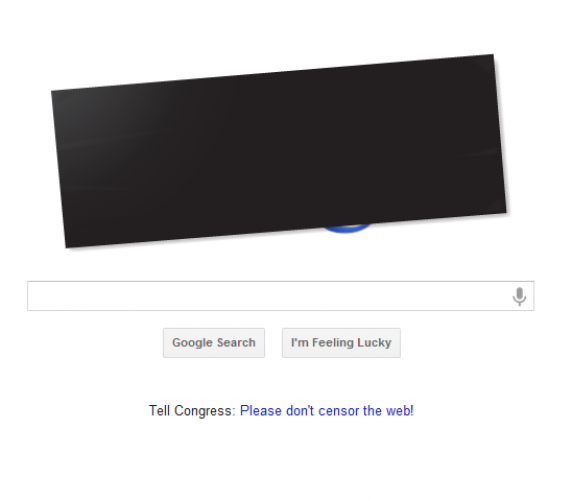As the week began, trending topics and web conversations dictated much of the internet marketing news and content on the web. Monday morning, many Americans spent days at home from work and school in honor of Martin Luther King Jr., celebrating the birthday of the civil rights activist and searching for information about the leader on the web.
Moving forward into the week, conversation and search activity quickly shifted to the Protect IP Act and Stop Online Piracy Act, two controversial pieces of legislation making their ways through the Senate and House of Representatives. Both bills were trending search and social topics throughout the week, and the proposed legislation generated substantial outcries from opponents, including Google, Facebook and Twitter.
On Wednesday, several major websites went dark in an effort to demonstrate their opposition. Among those that were completely inaccessible were Reddit and Wikipedia. Meanwhile, Google, Facebook and Twitter were still fully operational and offered their denouncements in other ways. In addition to statements and petitions, Google blacked out the logo on its home page as symbolic gesture.
Opposition to both PIPA and SOPA also came from the White House and other prominent politicians throughout the United States.
Aside from PIPA and SOPA, marketing news also came in its more usual forms this week. On Friday, Brafton reported that Google altered its search algorithm to penalize websites featuring excessive ads instead of informative content above the fold. Essentially, Google claims abundant ads force users to scroll down to access the content that attracted them to websites in the first place.
On its Inside Search blog, Google said the change will affect less than 1 percent of total searches. However, the company explained this move is aimed at making user experience a primary focus, and businesses launching SEO campaigns should take note. Those failing to factor user experience into the development, design and layout of their websites will suffer.
While the layout adjustment will mostly impact SEO, PPC campaigns also received some news on Friday. As part of Google’s quarterly earnings report, CEO Larry Page said that the company saw clicks on paid search ads increased 17 percent over the third quarter of 2011 and 34 percent when compared to the fourth quarter of 2010.
Page said Google is optimistic about the 2012. For marketers, the cost of PPC campaigns also yielded good news, with Page reporting cost per click fell 8 percent in the final three months of 2011.
Less expensive PPC campaigns will help businesses expand their web marketing operations moving forward, which will aid the countless businesses planning to focus more on content marketing and SEO, among other web channels. Brafton reported on Thursday that more than $40 billion will be allocated toward advertising on the web this year.
According to eMarketer, this figure represents substantial growth over 2011, when businesses in the U.S. invested more than $32 billion in the web. A combination of things will factor into increased digital marketing spend, as the economy has improved and marketers are seeing more value and success with their campaigns. The PPC and CPC figures from Google could mean greater ROI on paid search campaigns in 2012.
As companies increasingly shift their budgets toward online marketing, marketers are also expanding their goals drastically in 2012. They still want to see more sales, but they also appear to be thinking long term with their web marketing strategies as well. Brafton reported that more than 60 percent of businesses focusing on the web in 2012 named improving brand recognition as their No. 1 goal for the year. These businesses said they plan to distribute more brand journalism as part of internet campaigns, but they also expressed great confidence in using social media marketing as a driver of visibility, DIGIDAY and Vizu reported.
Being more aggressive on the web is hugely beneficial to for both B2C and B2B marketers, and a new study emphasizes how an online presence can be a boon for consumer-facing businesses. Brafton reported on Monday that 74 percent of shoppers included a study from Cisco said they conduct substantial research on the web before heading into the store to make a purchase.
These shoppers said that web content provides them with a greater understanding of products, increasing their confidence that they will see a return on their financial investments.
Businesses – in either the B2B or B2C sector – can use this information when planning content marketing campaigns by focusing on providing information about product or service value and helping prospects learn how to get the most out of their purchases. This insight might prove especially handy for blog or news content marketing campaigns aimed at female shoppers.
Brafton reported on Thursday that tech-savvy female shoppers are growing increasingly frustrated with a lack of understanding of their desires demonstrated by marketers, especially in terms of content. A study from The Heart Link Women’s Network found that the generational shift brought about by longer life expectancy among females and more influential roles held by women in the workplace has not been leveraged by marketers.
When creating content marketing campaigns aimed at women, the focus should not deal solely with maternal and domestic responsibilities, The Heart Link Women’s Network suggests. Active and dynamic lifestyles are the norm now for women in their 40s, 50s and 60s, and it’s critical for companies to understand this in order to target their audiences effectively.
Additionally, Brafton reported that content marketing is especially useful when selling consumer electronics to women. A new survey from BlogHer shows that 69 percent of women within its network, which is a largely professional, tech-savvy audience, named blogs as their most trusted shopping research resource. Blog content marketing, more than social media marketing or any other channel, compelled these respondents to act.
For those marketers comfortable with their content targeting, a new report might offer insights on the best publication times to reach different audiences. Brafton reported on Tuesday that various channels offer companies engagement opportunities on different days and times. The report, presented as an infographic from Dan Zarrella of Hubpot, said that engagement on Facebook and with site content was most common on the weekends, while social media marketing with Twitter is most effective during the week.
In general, publishing content on a schedule that is defined but not too rigid is the best bet for companies.
Thinking about trending topics or timely issues that might spark search trends can be an effective way for businesses to engage prospects on days that are slower than usual. Brafton highlighted Martin Luther King Jr. Day on Monday, pointing out that businesses can create content discussing King and the effect his contributions had on the business’ industry.
Looking ahead to next week, it appears that PIPA and SOPA are on their last legs and this could result in strong content ideas for businesses. Marketers should look out for news about the final verdict on the bills, and they might consider detailed news articles or blog posts about what the legislation could have meant for their industries to attract relevant searchers interested in staying abreast of the issue.
Beyond that, next week will mark the start of February – and that likely means online buzz about Valentine’s Day, the Super Bowl and some other holidays around the United States. Those events can translate into timely, insightful content.



